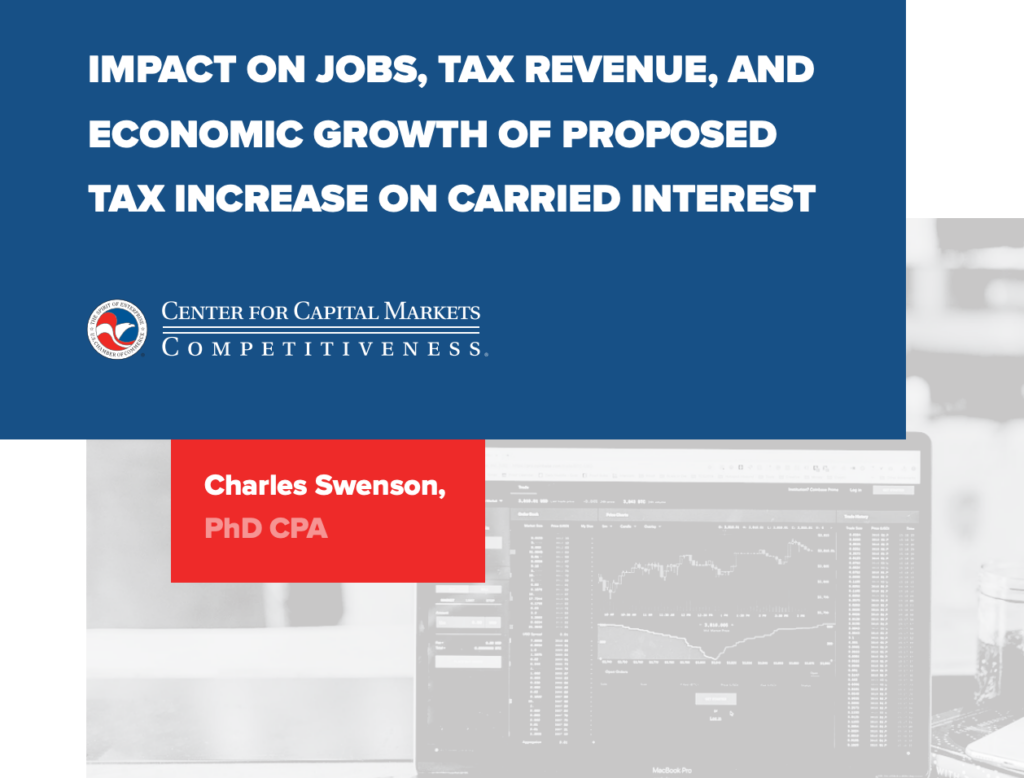
New Tax Threatens Small Business and Hurts Pensions
Private investment plays an increasingly important role in American job and economic growth. In 2020, private equity directly employed more than 11 million workers, supported more than 32,000 businesses and paid $218 billion in taxes. In 2021, 74 percent of private equity investments went to support small businesses.
As the U.S. economy contracts for a second consecutive quarter and fears of a recession rise, the last thing Washington should do is raise taxes on private investors who are helping rebuild the economy, create jobs, and deliver secure retirements for hard working Americans. Tax increases on carried interest would discourage investment in small businesses, workers, and innovation. Instead of increasing taxes, Congress should focus on delivering policies that will put more private investment to work for families across the country.
“We just learned that the economy shrank for the 2nd quarter in a row. Prices are going through the roof for families and employers. Now, some in Washington want to move forward with a new tax on private investment that will hurt jobs, pensions, and small businesses. Over 74% of private equity investment went to small businesses last year. As our economy faces serious headwinds, Washington should not move forward with a new tax on the private capital that is helping local employers survive and grow.”
American Investment Council President & CEO Drew Maloney
Study shows tax increases on carried interest would reduce investment and cause job losses

University of Southern California Marshall School of Business Professor Charles Swenson recently released a study examining how a proposed 98 percent tax increase on carried interest capital gains would result in millions of lost jobs, billions in lost tax revenue, and would limit returns for U.S. public pension funds. Key takeaways from the report include:
- Eliminating carried interest would result in the loss of over 4.9 million jobs, which is more than 3 percent of the country’s workforce.
- Reduction in federal, state, and local tax revenues by $96 billion per year over the long run.
- Public pension funds may lose up to $3 billion annually, forcing state governments to make up the shortfalls.
Read about the report from both POLITICO’s Morning Tax newsletter and a press release from the U.S. Chamber of Commerce.
Carried Interest Tax Increase Targets Minority Owned Businesses & Funds
Shila Nieves Burney is a general partner at Zane Venture Fund and Zane Access, which is a private equity fund that invests in and supports diverse entrepreneurs, businesses, and teams.
Last year, a group of minority-owned businesses, advocates, and fund managers expressed their strong opposition to tax increases on carried interest in a letter sent to Congressional leaders. The letter – signed by leaders of the National Association of Investment Companies representing diverse-owned private equity firms and hedge funds, the Black Economic Alliance, the National Black Chamber of Commerce and nearly 20 other groups – explains the harms of proposed changes to carried interest, which has been treated as capital gains since the Tax Code’s inception in 1913.
“As entrepreneurs of color, we believe this proposal will make it harder for us to continue to grow our businesses, support jobs in our communities, and achieve wealth for our families and employees. The Ways & Means Committee’s carried interest proposal stands to undercut the considerable progress that minority and diverse venture capital and private equity firm professionals are making across the country. The carried interest provisions undermine a vital source of capital and investment for minority-owned businesses and communities. Additionally, the provisions will make it harder for diverse entrepreneurs and business owners to climb the ladder of opportunity — after previous generations were allowed to benefit.”
How Does Private Equity Support Workers, Businesses, and Pension Funds?
Private equity invests capital in companies that are perceived to have growth potential and then works with these companies to expand or turnaround the business. This capital is contributed by large institutional investors and is organized into a fund. After three to seven years of ownership and working with the company, the fund manager will seek to “exit” the company by taking the business public or selling it for a higher valuation than it was purchased. This exit distributes profits from the sale (“returns”) to the investors in the fund and the fund manager. At the end of this process, private equity investments usually result in better jobs, stronger companies, and healthier communities.
Supporting Small Businesses
Small businesses are the lifeblood of local communities. In 2021 alone, 74 percent of more than $1 trillion in private equity investments went to support 5,205 businesses with fewer than 500 employees. These investments played a critical role in ensuring small businesses are making a resilient comeback after the challenges faced from the COVID-19 pandemic.
Click here to see how many private equity-backed small businesses are in each state.
Delivering the Strongest Returns for Public Pension Funds
Public pensions represent a promise to take care of the public servants who take care of us. In order to offer retirement security for dedicated public servants, these funds must consistently generate strong investment returns. The American Investment Council recently released its 2022 public pension study, which found that:
- In 2021, private equity investments delivered a median annualized return of 15 percent over a 10-year period for public pension funds across America that partner with private equity – a greater return than any other asset class.
- 176 U.S public pension funds invest in private equity, representing nearly 34 million public sector workers and retirees.
Click here to read the full report.

